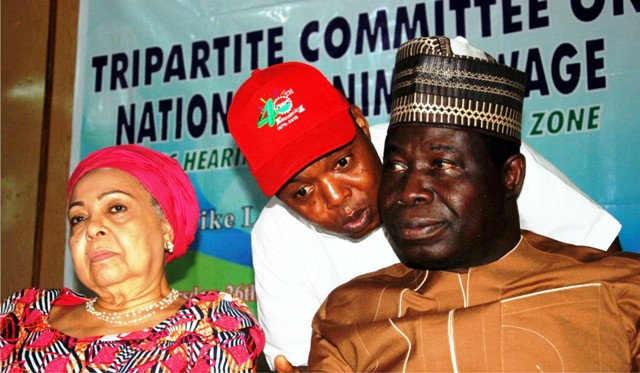Business
Buhari Inaugurates AfCFTA Action Committee

Nigeria’s position in the African Continental Free Trade Area (AfCFTA) remains that African economic and social integration must be rules-based and with built-in safeguards against injurious practices, President Muhammadu Buhari said.
President Buhari stated this on Friday in Abuja, when he inaugurated members of the National Action Committee for the Implementation of the AfCFTA Agreements.
According to reports, the AfCFTA is an important part of the African Union- 2063 Agenda to promote economic and social integration on the continent.
Buhari said the mandate of the members is to support the efforts of Ministries, Departments and Agencies (MDAs) of government, stakeholder associations and businesses to realize the benefits of AfCFTA, while putting measures to address any threat (to Nigeria’s national interest) that may arise.
He, therefore, maintained that all parties must work together and not allow any loopholes that might prove injurious to the Nigerian economy.
Buhari said: “We are very hopeful of creating a single African market for ‘Made -in- Africa’ goods and services. This trade, together with free movement of people and capital, will result in faster integration of African economies.
As a government, we must ensure that Nigeria’s position remains that, such integration must be rules-based with built-in safeguards, against injurious practices.
Our logic was simple: As Africa’s largest economy and most populous nation, we cannot afford to get it wrong. We consulted all key stakeholders. We also conducted a rigorous impact and readiness evaluation. It was after these consultations and studies, and satisfactory reports that I signed the AfCFTA Agreement on behalf of Nigeria in July this year.
We know the benefits and understand the challenges. It is clear that, for us to fully benefit from this agreement, we must have an implementation programme that reflects our national trade objectives and development plans”.
The President explained that, already, the government had established the National Action Committee on AfCFTA.
He also disclosed that he had directed all key ministers and senior government officials to provide maximum support to the Committee.
“For us as a government, our expectations from this agreement include job creation for our youths, increased production of our local raw materials and ultimately, exporting quality ‘Made-in-Africa goods’.
“You are to submit quarterly reports on your progress, and I look forward to receiving your first report in March 2020,’’ Buhari reminded members of the committee.
Earlier in his remarks, the Minister of Industry, Trade and Investment, Otunba Adeniyi Adebayo explained that AfCFTA was being negotiated in two phases.
He said the Phase I agreement comprises of the framework agreement; the protocols for trade in goods and trade in services; and the mechanism for dispute resolution.
Reports say that the Phase I agreement came into force on May 30, 2019 , one month after the 22nd African country ratified the agreement.
“Although, the main Phase agreement has been completed, negotiations are continuing on the annexures and appendices. Notable items being negotiated include among others, the schedule concessions for Goods and Services and the product specific Rules of Origin for the remaining 12 per cent of tariff lines”, he said.
It is estimated that the Schedule of Concessions will become effective in July 2020,’’ Adebayo said.
The minister also revealed that the Phase II negotiations would start in Jan. 2020 and would focus on investment; competition policy; and intellectual property rights.
According to Adebayo, in the preparations and actual negotiations, the relevant entities of government are involved.
He said stakeholders are also consulted and allowed to participate in the negotiations as observers.
The Minister said that the mandate of the National Action Committee includes: Conclusion of a common undifferentiated ECOWAS schedule of concessions for trade in goods and trade in services for AFCFTA and Common External Tariff (CET) negotiations.
Also, NAC is mandated to Championing programmes to resolve the critical continental level challenges such as smuggling and abuse of rules of origin, production capacity constraints as well as border and trade rules enforcement.
Transport
Automated Points Concession : FAAN Workers Gave 72hrs To Revise Decisions In PH

Transport
FAAN Announces Pick-Up Points for Go-Cashless Cards

Business
Fidelity Bank To Empower Women With Sustainable Entrepreneurship Skills, HAP2.0
-
Politics2 days ago
2027: NIGERIANS FAULT INEC ON DIGITAL MEMBERSHIP REGISTER DIRECTIVE
-

 Environment2 days ago
Environment2 days agoLAWMA Director Says Sweeping Reforms Have Improved Waste Collection
-
Politics2 days ago
LP Crisis: Ex-NWC Member Dumps Dumps Abure Faction
-

 Sports2 days ago
Sports2 days agoAbia Not Sure To Secure continental Ticket
-

 Politics2 days ago
Politics2 days agoUmahi Dismisses Allegations On Social Media, Insists On Projects Delivery
-

 Transport2 days ago
Transport2 days agoFAAN Announces Pick-Up Points for Go-Cashless Cards
-
Sports2 days ago
La Liga: Yamal Records First Career Hat-trick
-

 Sports2 days ago
Sports2 days agoCity Survive Leeds’ Challenge At Elland Road

